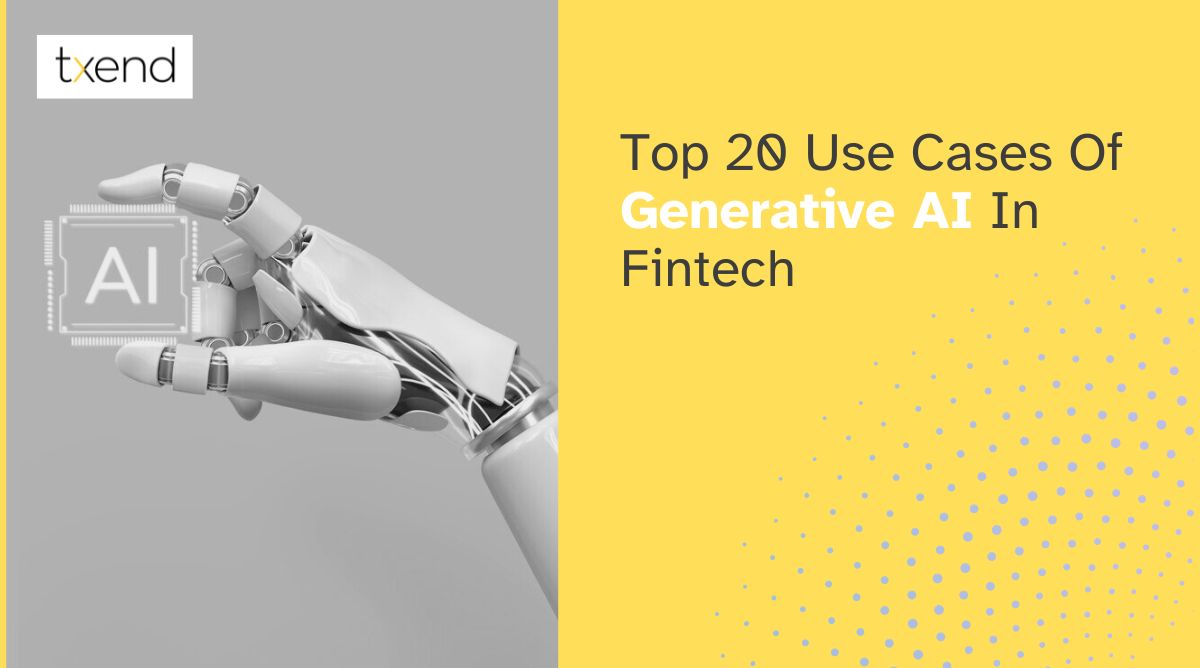In the pulsating landscape of American finance, the fusion of cutting-edge technology and innovative financial solutions is rapidly shaping the future. The field of financial technology, or fintech, is exploding with possibilities, and generative artificial intelligence (AI) is one of the fundamental forces driving this change.
From transforming the core operations of AI finance startups to empowering established AI finance companies, the impacts of generative AI in fintech are undeniably reshaping the contours of the industry.
In this comprehensive exploration, we delve into the pivotal role of generative AI in finance, unraveling the top 20 use cases propelling the sector forward. From optimizing risk management strategies to revolutionizing the customer experience, the marriage of fintech and AI has set a new precedent for financial ingenuity.
Join us on a journey to uncover how generative AI and fintech convergence drive unprecedented growth, foster innovation, and revolutionize financial services’ foundations.
Key Takeaways
- Generative AI revolutionizes fintech with innovation, personalization, risk management, and automation.
- Generative AI in fintech synthesizes data, automates tasks, and enhances predictive analysis for personalized, efficient financial services.
- The future holds enhanced personalization, advanced risk management, and ethical governance in generative AI for fintech’s transformative growth.
What is Generative AI?
Generative AI is an advanced subset of artificial intelligence (AI) that focuses on creating or generating new content, such as images, text, or even music, that imitates or resembles human creativity.
Unlike traditional AI, which is primarily used for problem-solving and making decisions based on existing data, generative AI can produce original and innovative outputs, often indistinguishable from those created by humans.
In fintech, generative AI is pivotal in driving innovation and efficiency, revolutionizing various aspects of financial services, including risk management, customer service, and personalized financial products.

What is Fintech?
Fintech, short for financial technology, refers to the innovative use of technology to deliver and automate financial services. It covers a broad spectrum of applications, such as online lending platforms, robo-advisors, bitcoin, and mobile payment apps.
Fintech companies leverage cutting-edge technologies such as artificial intelligence, blockchain, and big data to streamline and enhance various financial activities, making them more accessible, efficient, and cost-effective for businesses and consumers.
Fintech has brought in a new era of digital finance by revolutionizing how people and organizations manage, access, and use their finances. It has also had a profound impact on traditional financial services.
The Role Of Generative Ai In Fintech
The integration of generative AI in US-based Fintech fosters a seismic shift in how financial services are conceptualized, delivered, and experienced. Generative AI is revolutionizing the landscape by enabling AI finance startups and established companies to create innovative solutions and streamline complex financial processes.
By leveraging advanced algorithms, generative AI in Fintech enhances predictive analysis, facilitates personalized customer experiences, and drives the development of sophisticated risk management strategies.
This technology enables Fintech companies to offer tailored financial products, improve fraud detection mechanisms, and automate intricate tasks, bolstering operational efficiency and fostering a more secure and responsive financial ecosystem in the United States.
How Does Generative Ai Work For Fintech?
Generative AI in Fintech operates as a transformative force in the financial technology sector in the United States. It harnesses artificial intelligence’s power, particularly deep learning models, to generate new data, content, or solutions that mimic human creativity and problem-solving capabilities.
Here’s a brief explanation of how Generative AI works for Fintech in the US:
Data Synthesis and Enhancement:
Generative AI can synthesize financial data and generate realistic datasets, which are invaluable for AI finance startups and Fintech companies. These datasets can be used for risk assessment, trend analysis, and training AI models for fraud detection and customer profiling.
Natural Language Processing (NLP):
Fintech applications often involve vast amounts of text data, such as customer inquiries and market news. Generative AI, through NLP, can understand and generate human-like text responses, enhancing chatbots and customer support systems.
Personalization:
Generative AI algorithms enable the creation of highly personalized financial products and services. By analyzing customer data and preferences, Fintech companies in the US can generate tailored investment recommendations, insurance packages, or savings plans.
Predictive Analytics:
Generative AI models can forecast market trends, investment opportunities, and potential risks by analyzing historical financial data. This is particularly valuable for AI finance companies and investors seeking data-driven insights.

Risk Management:
Generative AI can create risk assessment models that analyze various factors to evaluate the potential risks associated with financial transactions, investments, or loans. This is crucial for maintaining the stability and security of the financial system.
Customer Experience Enhancement:
Generative AI can craft realistic, customer-specific financial scenarios, making it easier for individuals to understand the impact of their financial decisions. It can also generate interactive financial planning tools.
Fraud Detection:
In the US, Generative AI is instrumental in identifying fraudulent activities by generating anomaly detection algorithms. It can identify unusual patterns and flag potential fraud in real-time, safeguarding financial transactions and systems.
Automation:
Generative AI can automate repetitive and time-consuming financial tasks, improving operational efficiency for Fintech companies in the US. This includes automating document processing, loan underwriting, and compliance checks.
Generative AI is reshaping the landscape of Fintech in the United States by providing the tools and solutions needed to stay competitive, enhance customer experiences, and navigate the intricacies of the financial industry with increased efficiency and security.
Top 20 use cases of generative Ai in fintech
Risk Assessment and Management:
Accurate risk assessment models are made possible by generative AI, guaranteeing a thorough grasp of the possible dangers connected to financial transactions. For instance, it can help predict credit default probabilities for loan applications, enabling AI finance startups like Upstart and Petal to make informed lending decisions.
Algorithmic Trading:
Generative AI empowers automated trading strategies by analyzing market trends and patterns, leading to efficient decision-making in high-frequency trading.
Companies like QuantConnect and Alpaca utilize Generative AI to optimize trading algorithms for enhanced performance and profitability.
Fraud Detection:
By analyzing transactional data and user behavior, Generative AI can identify anomalies and potential fraud in real-time. Companies like Feedzai and Forter leverage Generative AI to detect fraudulent activities and secure financial transactions, protecting both businesses and consumers from fraudulent attacks.
Customer Service Enhancement:
Generative AI improves customer service through intelligent chatbots and virtual assistants, providing prompt and personalized assistance to users. Examples include Bank of America’s Erica, which utilizes Generative AI to offer financial guidance and support to customers round the clock.
Credit Scoring and Underwriting:
Generative AI aids in streamlining credit scoring and underwriting processes by analyzing diverse data points, leading to more accurate and inclusive credit assessments.
Companies such as Zest AI and Credit Kudos utilize Generative AI to offer fair and transparent credit scoring models, expanding access to credit for underserved communities.
Portfolio Management:
Generative AI assists in constructing and managing investment portfolios based on individual risk profiles and financial goals. Wealthfront and Betterment use Generative AI to offer personalized investment strategies and portfolio rebalancing, optimizing returns for their clients.
Predictive Analytics for Investment:
By analyzing historical data and market trends, Generative AI aids in making informed investment decisions, predicting future market trends and asset performance.
Hedge funds and investment firms use Generative AI to forecast stock prices and optimize investment strategies, enhancing their portfolio performance.
Automated Financial Advisory Services:
Generative AI powers automated financial advisory services by offering personalized investment recommendations and financial planning strategies.
Examples include companies like Wealthsimple and Personal Capital, which leverage Generative AI to provide tailored financial advice and investment guidance to their clients.
Insurance Underwriting and Claims Processing:
Generative AI streamlines insurance underwriting processes by analyzing various risk factors, enabling accurate premium assessments and policy customization.
Companies such as Lemonade and Root use Generative AI to simplify underwriting and claims processing, providing faster and more efficient insurance services to their customers.

Natural Language Generation for Financial Reporting:
Generative AI aids in generating comprehensive and insightful financial reports by analyzing complex financial data, providing concise and easily understandable summaries.
Companies like Narrative Science and Arria NLG utilize Generative AI to automate the generation of financial reports and analyses, facilitating faster decision-making for businesses and investors.
Anti-Money Laundering Compliance:
Generative AI assists financial institutions in identifying and preventing money laundering activities by analyzing transactional data and detecting suspicious patterns.
Generative AI is used by businesses like ComplyAdvantage and Chainalysis to guarantee regulatory compliance and stop illegal financial activity.
Market Research and Trend Analysis:
Generative AI enables in-depth market research and trend analysis by processing vast amounts of data, providing valuable insights for businesses to make strategic decisions.
Companies such as CB Insights and AlphaSense utilize Generative AI to offer comprehensive market research reports and trend analyses, empowering businesses to stay ahead of market trends and dynamics.
Automated Trading Strategy Development:
Generative AI assists in developing and optimizing automated trading strategies by analyzing historical market data and identifying profitable trading opportunities.
Quantopian and Darwinex utilize Generative AI to facilitate the development of robust and sophisticated trading algorithms, enhancing the overall performance of automated trading systems.
Regulatory Compliance and Reporting:
Generative AI streamlines regulatory compliance and reporting processes by ensuring adherence to complex financial regulations and guidelines.
Companies like ComplySci and Onfido utilize Generative AI to simplify compliance procedures and enhance reporting accuracy, mitigating regulatory risks for financial institutions and businesses.
Personalized Banking Services:
Generative AI facilitates the provision of personalized banking services by analyzing customer data and preferences, offering tailored financial products and solutions.
Utilizing generative AI, businesses like Chime and Varo Bank offer individualized banking experiences to cater to each client’s specific needs. These experiences include tailored savings programs, budgeting tools, and financial advice.
Algorithmic Risk Hedging:
Generative AI aids in algorithmic risk hedging by developing sophisticated risk management strategies that minimize financial exposure and maximize risk-adjusted returns.
Hedge funds and investment firms utilize Generative AI to develop dynamic risk hedging models, safeguarding their portfolios from market volatility and uncertainties.
Dynamic Pricing in Financial Products:
Generative AI assists in dynamic pricing for financial products by analyzing market demand, customer behavior, and competitive pricing strategies, optimizing pricing models for enhanced profitability.
Companies like Affirm and PayPal utilize Generative AI to offer dynamic pricing options and personalized financial products, attracting and retaining a broader customer base.
Robo-advisory Services:
Generative AI powers robo-advisory services by providing automated investment recommendations and portfolio management solutions based on individual risk profiles and financial goals.
Generative AI is used by firms like Wealthfront and Betterment to provide affordable and easily accessible investment consulting services that are tailored to a variety of investors and their individual financial requirements.
Personalized Fraud Prevention:
Generative AI assists in personalized fraud prevention by analyzing customer behavior and transactional data, identifying potential fraud patterns and securing financial transactions in real-time.
Companies like Forter and Sift utilize Generative AI to offer personalized fraud prevention solutions, enhancing the security and trustworthiness of online financial transactions for businesses and consumers.
Blockchain-based Financial Transactions:
Generative AI aids in secure and efficient blockchain-based financial transactions by ensuring transparency, authenticity, and data integrity in peer-to-peer transactions.
Companies like Ripple and Gemini utilize Generative AI to enable seamless and secure cryptocurrency transactions, fostering trust and reliability in the evolving landscape of digital finance.
Generative AI continues to revolutionize the Fintech sector in the US, empowering businesses with innovative solutions and advanced capabilities to navigate the complexities of the financial industry, enhance customer experiences, and drive sustainable growth and development.
What does the future hold of generative AI in fintech?
The future of generative AI in fintech is poised to redefine the landscape of financial services, introducing transformative advancements and reshaping how businesses and consumers interact with the financial ecosystem.
Here’s a brief exploration of what the future holds for generative AI in fintech:
Enhanced Personalization:
Generative AI will enable the delivery of highly personalized financial services, catering to the specific needs and preferences of individual users.
This will result in tailored investment strategies, customized banking solutions, and personalized insurance products, fostering a more inclusive and customer-centric financial experience.
Advanced Risk Management:
The future of generative AI in fintech will witness the development of more sophisticated risk management models, capable of analyzing complex datasets and predicting potential risks with greater accuracy.
This will lead to a more secure and resilient financial environment, mitigating risks and ensuring the stability of the financial system.
Seamless Automation:
Generative AI will streamline and automate intricate financial processes, including regulatory compliance, fraud detection, and investment management.
This will enhance operational efficiency, reduce human error, and enable financial institutions to focus on strategic decision-making and value-added services, driving overall productivity and profitability.
Innovative Product Development:
Fueled by generative AI, fintech companies will introduce innovative financial products and services, leveraging advanced algorithms to create new investment opportunities, insurance solutions, and lending models.
This will foster financial inclusion, encouraging participation from a broader spectrum of individuals and businesses in the financial marketplace.

Ethical and Transparent AI Governance:
The future of generative AI in fintech will prioritize ethical AI governance, emphasizing the importance of transparency, fairness, and accountability in AI-driven financial decision-making.
This will ensure that AI algorithms and systems align with regulatory standards and ethical principles, promoting trust and confidence among consumers and regulatory bodies.
Augmented Cybersecurity Measures:
Generative AI will bolster cybersecurity measures within the fintech industry, equipping businesses with advanced tools to detect and prevent cyber threats and fraudulent activities.
This will fortify the security of financial transactions, safeguard sensitive data, and build a more resilient defense against evolving cybersecurity risks and challenges.
Expanding Integration of Blockchain Technology:
The future of generative AI in fintech will witness an increased integration of blockchain technology, facilitating secure and transparent transactions, smart contracts, and decentralized financial solutions.
This integration will revolutionize how financial data is stored, shared, and managed, promoting efficiency, trust, and decentralization within the financial ecosystem.
Evolving Regulatory Compliance Frameworks:
Generative AI will be crucial in shaping and adapting regulatory compliance frameworks, ensuring that fintech companies adhere to evolving regulatory requirements and standards. This will promote a culture of regulatory compliance, reducing compliance-related risks and fostering a more stable and sustainable fintech environment.
In conclusion, generative AI in fintech has the potential to develop innovation, inclusivity, and trust in the financial sector, opening the door to a more seamless, secure, and customer-focused financial ecosystem that can change to meet the changing demands of both consumers and businesses.
What Are the Security and Privacy Concerns with Generative AI in Fintech?
The integration of generative AI in the Fintech sector in the US introduces a range of security and privacy concerns that require careful consideration and proactive measures to ensure the integrity and confidentiality of sensitive financial data.
Here’s a brief exploration of the security and privacy concerns associated with generative AI in Fintech in the US:
Data Privacy Risks:
Generative AI relies on vast datasets, which may contain sensitive financial information. Privacy concerns arise regarding the collection, storage, and use of this data, especially in instances where personal financial information is susceptible to unauthorized access, leading to potential breaches and misuse.
Cybersecurity Vulnerabilities:
The adoption of generative AI in Fintech introduces new entry points for potential cyber threats and attacks. Malicious actors may try to alter data inputs or exploit flaws in AI algorithms, jeopardizing the accuracy of client information, financial transactions, and proprietary financial models.
Bias and Fairness Issues:
The use of generative AI algorithms in Fintech may inadvertently perpetuate biases, leading to discriminatory practices in financial decision-making processes.
This not only poses ethical concerns but also highlights the risk of propagating biased financial services that may impact individuals and communities disproportionately.
Regulatory Compliance Challenges:
Fintech companies integrating generative AI must navigate complex regulatory landscapes governing data protection and privacy.
Maintaining adherence to legal requirements, including the CCPA and GDPR, while using generative AI in financial operations is difficult and necessitates a deep comprehension of changing legal environments.

Adversarial Attacks and Manipulation:
Generative AI models in Fintech are susceptible to adversarial attacks, wherein malicious actors manipulate AI-generated outputs to deceive systems and users.
This can lead to fraudulent activities, such as fake financial reports or manipulated investment recommendations, undermining the trust and reliability of AI-driven financial services.
Data Security Breaches:
Inadequate security measures may lead to data breaches, exposing sensitive financial data to unauthorized access and exploitation.
Such breaches can have severe repercussions, including financial losses, reputational damage, and legal consequences for Fintech companies, impacting their credibility and market trust.
Lack of Explainability and Transparency:
The complex nature of generative AI models often results in a lack of explainability and transparency in the decision-making process.
This opacity raises concerns among consumers and regulators, as it hinders the ability to comprehend how AI-driven financial decisions are made, leading to skepticism and mistrust.
Data Governance and Storage Challenges:
Effectively managing and safeguarding the vast amounts of data used in generative AI models pose significant data governance and storage challenges. Ensuring data integrity, accessibility, and protection throughout the data lifecycle requires robust data governance frameworks and secure storage infrastructure.
Addressing these security and privacy concerns in Fintech’s context of generative AI necessitates a holistic approach that emphasizes proactive risk management, robust cybersecurity measures, ethical AI governance, and strict adherence to evolving regulatory standards.
Fintech companies must prioritize the development of comprehensive security protocols, transparent AI practices, and stringent data protection strategies to build a resilient and trustworthy AI-driven financial ecosystem.
Solutions for the Security and Privacy Concerns with Generative AI in Fintech
Strong security protocols, proactive risk management, and moral AI governance are key components of a multipronged strategy that addresses the security and privacy issues related to generative AI integration in the US Fintech industry.
Here’s a brief exploration of the solutions for the security and privacy concerns with generative AI in Fintech:
Robust Data Encryption and Secure Storage:
Implementing robust data encryption protocols and secure storage infrastructure is essential to safeguard sensitive financial data from unauthorized access and cyber threats.
Employing industry-standard encryption algorithms and secure data storage solutions can significantly enhance data security and mitigate the risks of data breaches.
Ethical AI Governance and Transparency:
Establishing ethical AI governance frameworks that prioritize transparency, fairness, and accountability in AI-driven financial decision-making is crucial.
Promoting explainable AI practices, conducting regular audits, and fostering transparency in AI algorithms can build trust among stakeholders and enable better oversight of AI-driven financial services.
Adversarial Training and Model Testing:
Conducting thorough adversarial training and rigorous model testing is essential to identify and mitigate vulnerabilities within generative AI models.
By subjecting AI models to simulated attacks and adversarial testing, Fintech companies can enhance the resilience of their AI systems and proactively address potential security loopholes and vulnerabilities.
Privacy by Design and Data Minimization:
Implementing privacy by design principles and practicing data minimization strategies can help reduce the collection and storage of unnecessary personal data, thereby minimizing privacy risks.
Adopting anonymization techniques, implementing access controls, and conducting regular data privacy impact assessments can enhance data privacy and minimize exposure to privacy breaches.

Regulatory Compliance and Standards Adherence:
Ensuring strict compliance with regulatory standards, such as GDPR and CCPA, is imperative for Fintech companies leveraging generative AI.
Staying abreast of evolving data protection regulations, adhering to industry best practices, and integrating privacy-enhancing technologies can help mitigate legal and regulatory risks associated with data security and privacy in the Fintech sector.
Continuous Monitoring and Incident Response Planning:
Implementing robust monitoring systems and establishing proactive incident response plans can enable Fintech companies to detect and respond to security threats and privacy breaches in real-time.
Organizations can effectively limit risks and lessen the impact of potential security incidents by using advanced threat detection technologies and performing regular security evaluations.
Employee Training and Awareness Programs:
Educating employees about security best practices, data privacy guidelines, and ethical AI usage is critical for fostering a culture of security awareness and responsibility within the organization.
Providing regular training sessions, promoting ethical conduct, and encouraging a security-first mindset among employees can significantly strengthen the overall security posture of Fintech companies leveraging generative AI.
Collaboration and Information Sharing:
Facilitating collaboration and information sharing among industry stakeholders, regulatory bodies, and cybersecurity experts can foster a collective approach to addressing security and privacy concerns in the Fintech sector.
Participating in information-sharing initiatives, collaborating with regulatory authorities, and engaging in industry forums can promote knowledge exchange and foster a proactive cybersecurity and privacy management culture within the Fintech ecosystem.
By implementing these comprehensive solutions, Fintech companies can effectively mitigate security and privacy concerns associated with the integration of generative AI, fostering a secure and trustworthy environment for AI-driven financial services in the US.
Are there Ethical Considerations in Using Generative AI for Financial Decision-making?
The integration of generative AI in financial decision-making processes raises critical ethical considerations that require careful attention and proactive measures to ensure responsible and fair practices within the Fintech industry.
Here’s a brief exploration of the ethical concerns associated with using generative AI for financial decision-making:
Bias and Fairness:
Generative AI algorithms may inadvertently perpetuate biases in the training data, leading to discriminatory outcomes in financial decision-making.
Addressing bias and ensuring fairness is crucial to prevent the reinforcement of systemic inequalities and promote equitable access to financial services for all individuals and communities.
Transparency and Explainability:
The complex nature of generative AI models often results in a need for more transparency and explainability, making it challenging for stakeholders, including consumers and regulatory bodies, to understand the rationale behind AI-driven financial decisions.
Promoting transparency and establishing mechanisms for explainable AI can foster trust and accountability within the Fintech ecosystem.
Data Privacy and Consent:
Large volumes of sensitive financial data must be gathered and analyzed in order to apply generative AI to financial decision-making processes.
Respecting data privacy, ensuring data security, and obtaining explicit consent from individuals regarding using their financial information are crucial ethical imperatives to safeguard consumer privacy and confidentiality.

Regulatory Compliance and Governance:
Fintech companies leveraging generative AI must adhere to evolving regulatory standards governing data protection, consumer rights, and ethical AI practices.
Implementing robust governance frameworks and compliance measures is essential to ensure ethical and responsible use of generative AI for financial decision-making, mitigating potential legal and regulatory risks.
Accountability and Responsibility:
Adopting generative AI in financial decision-making necessitates a clear delineation of accountability and responsibility among stakeholders, including Fintech companies, developers, and regulatory bodies.
Establishing accountability and ethical oversight mechanisms can help prevent the misuse or manipulation of AI-driven financial services, fostering a culture of responsible innovation and ethical conduct.
Consumer Protection and Trust:
Prioritizing consumer protection and fostering trust within the Fintech ecosystem is essential when deploying generative AI for financial decision-making.
Upholding ethical standards, ensuring transparency in communication, and empowering consumers with control over their financial data and decisions are key to fostering trust and maintaining the integrity of AI-driven financial services.
Societal Impact and Inclusivity:
Considering the broader societal impact of generative AI in financial decision-making is crucial to promote inclusivity and socioeconomic empowerment.
The promotion of AI-powered financial solutions that address the varied requirements and inclinations of marginalized populations can aid in the advancement of financial inclusion and the mitigation of socioeconomic divides.
Navigating these ethical considerations requires a proactive and multidimensional approach that integrates ethical guidelines, promotes transparency, and prioritizes protecting consumer rights and interests.
By upholding ethical standards and promoting responsible AI practices, the Fintech industry can harness the transformative potential of generative AI while safeguarding the well-being and trust of consumers and communities.
How can Txend help?
Txend is a fintech app development company that uses generative AI to help its clients create more innovative and user-friendly apps. Artificial intelligence that can produce original text, code, graphics, and music is known as generative AI.
Txend uses generative AI to automate many of the tasks involved in fintech app development, such as:
- Generating code: The generative AI platform from Txend can produce code in many different programming languages, such as C++, Python, and Java. This can assist developers of banking apps save time and prevent mistakes.
- Creating user interfaces: Txend’s generative AI platform can also create user interfaces for fintech apps. This can help fintech app developers to create more user-friendly and engaging apps.
- Developing new features: Txend’s generative AI platform can also be used to develop new features for fintech apps. For example, Txend’s generative AI platform can be used to develop chatbots that can answer users’ questions about their financial products and services.
Here are some specific examples of how Txend has used generative AI to develop fintech apps:
A personalized investment app:
Txend assisted a fintech business in creating a personalized investing app that makes recommendations to users based on their risk tolerance and unique financial condition using generative AI.
A fraud detection app:
Txend helped a bank to develop a fraud detection app that uses generative AI to identify fraudulent transactions.
A financial literacy chatbot:
Txend helped a non-profit organization to develop a financial literacy chatbot that uses generative AI to answer users’ questions about personal finance.
Overall, Txend is using generative AI to help fintech companies to develop more innovative, user-friendly, and secure fintech apps.
Frequently Asked Questions
Generative AI enhances customer service in Fintech by enabling the development of intelligent chatbots and virtual assistants that can provide personalized and prompt assistance to users, resolving queries, offering financial guidance, and facilitating smoother interactions between customers and Fintech services.
Yes, Generative AI can assist Fintech companies in regulatory compliance by automating compliance checks, facilitating the analysis of complex regulatory frameworks, and ensuring adherence to legal standards.
By leveraging Generative AI, companies can streamline regulatory reporting, detect potential compliance violations, and mitigate legal risks effectively.
Fintech companies should be aware of challenges such as data privacy concerns, potential biases in AI algorithms, regulatory complexities, the need for skilled AI professionals, and the risk of cyber threats.
They should also consider the transparency and explainability of AI decision-making processes, ensuring ethical use and governance of AI, and addressing potential consumer skepticism about AI-driven financial services.
Conclusion
In conclusion, the dynamic interplay between generative AI and the burgeoning landscape of fintech is reshaping the contours of modern finance. From empowering AI finance startups to fortifying the strategies of established ai finance companies, the multifaceted applications of generative AI in fintech underscore its transformative potential.
Through personalized customer experiences, streamlined risk management, and innovative financial solutions, the convergence of fintech and AI is ushering in a new era of unprecedented possibilities and heightened efficiency.
As the realm of finance continues to evolve, embracing the synergies of generative AI in fintech stands as a testament to the industry’s commitment to innovation, adaptability, and sustainable growth, solidifying its position at the forefront of technological advancement and financial ingenuity.



